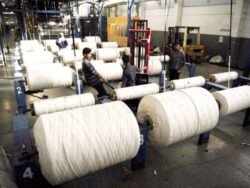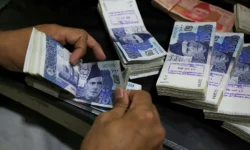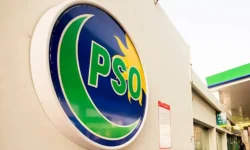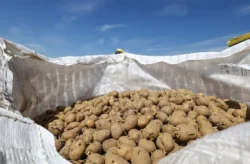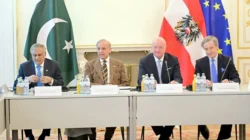TRANSFORMATIVE GROWTH: 2023 A YEAR OF ECONOMIC ADVANCEMENTS IN PAKISTAN
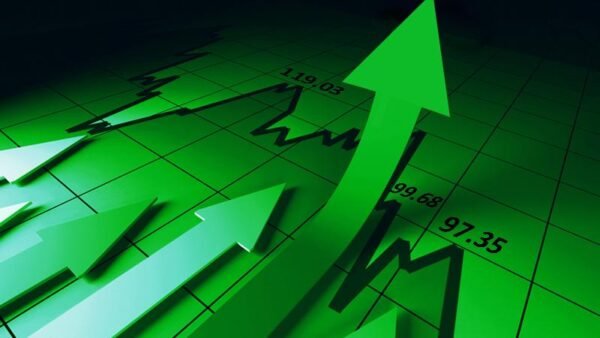
By: Maria Mansab
Pakistan has achieved significant economic development and implemented effective governance strategies in 2023, resulting in a year of transformative progress. The year 2023 has been characterized by an array of pioneering initiatives and policy measures. The nation has been advancing substantially using strategic initiatives such as SIFC, resumption of the IMF program, collaboration between SIFC and CPEC, and foreign investment. This favorable trajectory is not limited to a solitary sector; on the contrary, it represents an all-encompassing expansion observed in numerous industries and economic sectors.
It is becoming increasingly apparent that Pakistan is progressing towards sustainable development, which is garnering global recognition and establishing a foundation for a prosperous future. The resolute dedication of the government to preventing unlawful operations, specifically in the Afghan transit trade, has not only enhanced the security of the nation but also instigated a substantial transformation in the economic landscape in 2023.
The government has imposed a 10% processing fee on Afghan transit trade agreement imports to deter illicit entry. It discouraged smuggling and ensured correct taxation. Pakistanis have benefited from Balochistan’s anti-smuggling policies. Millions of dollars were trafficked into Afghanistan daily. The dollar has fallen due to effective anti-smuggling measures, showed economic stabilization in 2023. The common man has also benefited from lower gas and grain prices. The successful Balochistan anti-smuggling efforts have relieved Pakistanis. Smuggling used to bring millions of dollars into Afghanistan every day. Bloomberg claimed $5 million in daily exchange by merchants and smugglers. However, strong anti-smuggling measures have turned the economy around.
The dollar has fallen from Rs315 to Rs276, signaling economic stabilization. Gasoline prices dropped from Rs330 to Rs283 and grain prices from Rs10,000 to Rs7,500. The security forces also seized a lot of urea being trafficked into Afghanistan. This has lowered urea prices from Rs600 to Rs500 per sack. Collective efforts demonstrated the efficiency of anti-smuggling measures and their positive influence on Pakistan’s economy. The Forex Association reported $1 billion in bank deposits after a crackdown. The typical daily currency dealer trading volume has increased from $5–7 million to $50 million.
Multiple sector expansions have strengthened Pakistan’s economy in 2023. The mining, energy, agriculture, regional exports, textile exports, and international investments have risen. The SBP’s Prime Minister’s Kissan Package 2022 increased agricultural funding and economic activity in flood-stricken areas. The UN FAO has undertaken 40 ambitious agriculture reforms in Pakistan. These efforts have improved food security, agriculture, and the rural economy. Corporate farming and modern agriculture are SIFC priorities. SIFC-supervised modern agricultural projects cover 4.4 million acres. Economic stability and trade links with other nations increase, boosting the economy’s future.
The government authorized the Framework Guidelines for Fast Track Solar Initiatives 2022 in FY23 to create and market affordable local renewable energy sources. In addition, importers and local suppliers of solar panels are granted an exemption from sales tax. Throughout the initial three months of fiscal year 2023, IGNITE established additional National Incubation Centers in diverse cities to assist nascent enterprises and women entrepreneurs. PSEB expanded its infrastructure by constructing seven special technology parks across Pakistani cities. The Chief of Army Staff and the Caretaker Prime Minister oversaw the SIFC’s efforts, which led to the following outcomes. In this regard, the IMF has even acknowledged Pakistan’s initiative. The energy, mining, agriculture, and information technology sectors are the primary focuses of the government in its endeavor to safeguard economic stability.
Many recommendations for review with friendly nations were unanimously supported by the SIFC. The committee has ordered numerous major initiatives to be completed as quickly as possible. Pakistani exports to the region rose 14.21% in 2023. This growth indicates a good trade sector trend and supports the government’s export policy and Pakistani products’ international competitiveness. Kazakhstan wants to buy more Pakistani textiles for its $2 billion market. This strengthens bilateral commercial links and boosts Pakistan’s textile industry. $10 billion in energy, labor, and defense MoUs are anticipated to be signed between Pakistan and Kuwait. Pakistan and the UAE signed billion-dollar MoUs. These agreements are expected to boost foreign investment, economic growth, and job creation.
NLC accomplished a significant milestone in 2023 by commencing cargo exports to Kazakhstan and Kyrgyzstan, thereby charting the nation’s economic and strategic trajectory. This transit corridor will connect Pakistan, China, and the Central African Republic, and offer significant strategic and economic benefits for both Pakistan and the region as a whole. The IMF, WB, and Fitch rating agencies have all confirmed Pakistan’s economic trajectory, classifying the country as CCC+.
UAE mining company to invest Rs 2.5 billion in Pakistani mine. This investment will improve mining and the economy. The government prioritizes energy, mining, agriculture, and IT for economic stability. SIFC policy favors foreign investment in utilities, agribusiness, and IT.
The current account deficit experienced a substantial decline from $3.1 billion during the same period in FY23 to $1.1 billion during October of FY24. This enhancement serves as evidence of the efficacy of the government’s economic policies and the robustness of the national economy. These advancements suggest that the economy of Pakistan is progressing positively. As a result of government initiatives, budgetary, investment, and trade indicators have all increased.

